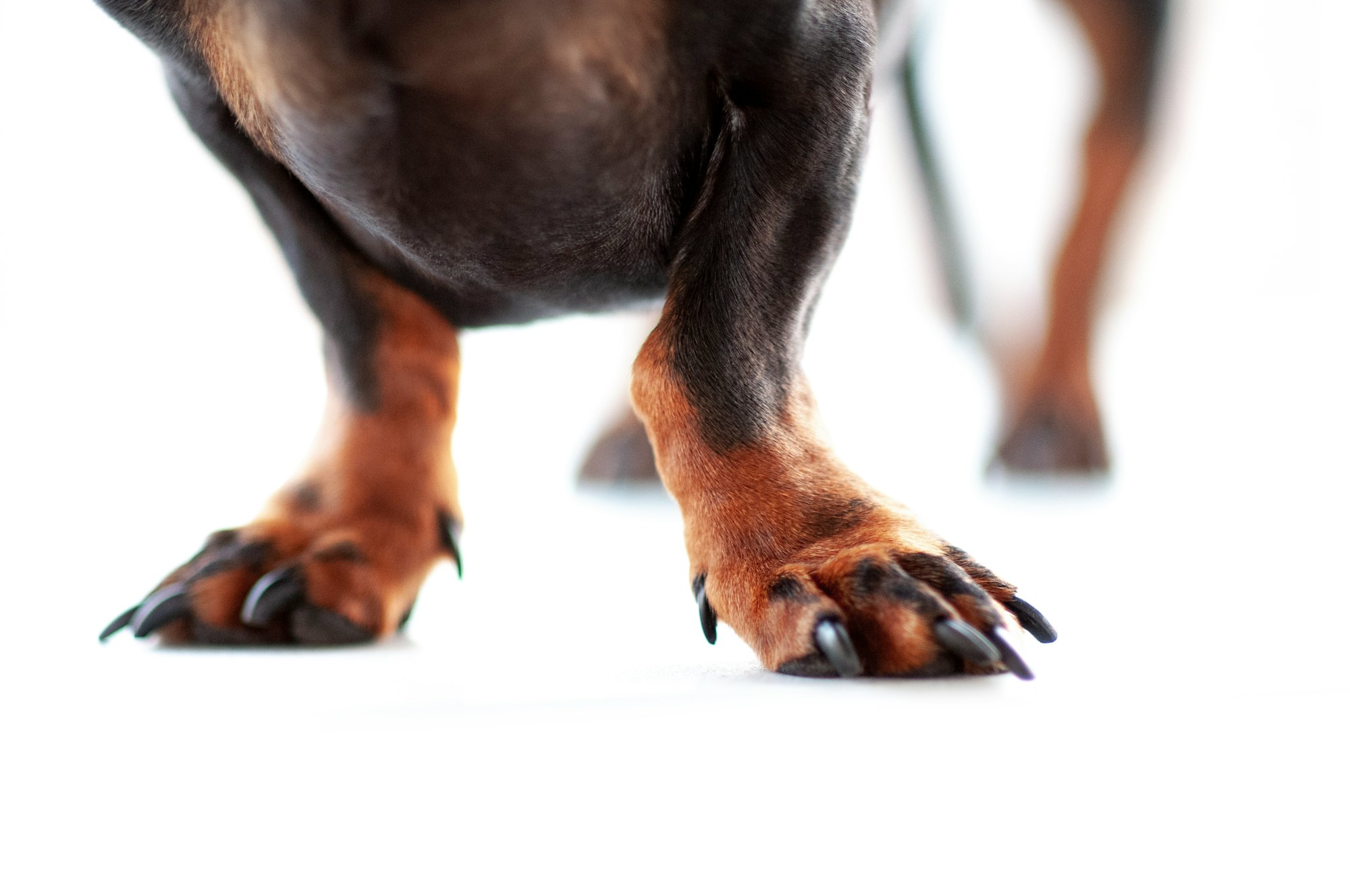One thing you can count on when you invite a dog into your home and life is that cleaning up after them becomes a part of the routine. Dogs, much like children, have their messy moments. They may accidentally knock things over or, at times, regrettably leave behind vomit on the furniture or floor. And yes, sometimes they may even throw up a significant amount!
While it may be a messy inconvenience, most of the time, throwing up after drinking water is not a cause for immediate concern. However, as responsible dog owners, it's important to distinguish what's normal and when it might be necessary to seek veterinary advice. In this article, we will explore the range of reasons why your dog may experience water-induced vomiting, starting with the less serious possibilities. Together, we will unravel the secrets behind this curious behavior and provide insights to help you navigate your dog's well-being with confidence. So, let's dive in and discover the factors that could be triggering your dog's post-water vomiting episodes.
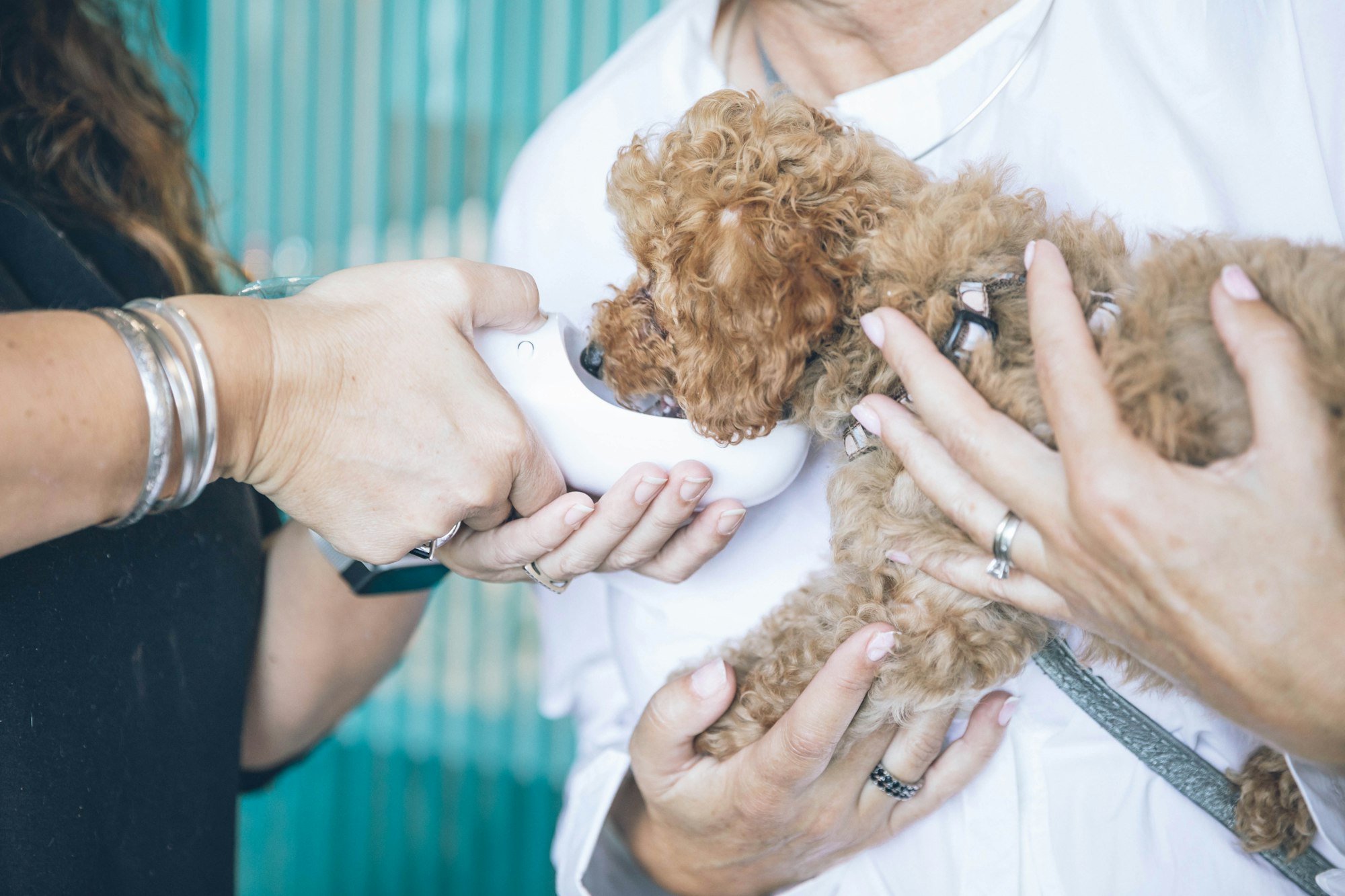
Understanding Why Your Dog Vomits After Drinking Water and How Fi Can Help Keep Them Safe
As a dog owner, it's essential to be prepared for the occasional mess that comes with caring for our furry companions, including when they vomit after drinking water. This common occurrence can stem from various causes, such as drinking too much too fast, consuming contaminated water, or underlying health issues like parasites or heat exhaustion. While occasional vomiting may not be a cause for immediate alarm, it's crucial to monitor your dog and consult a veterinarian if symptoms persist or worsen.
To ensure your dog's well-being, it's important to understand the triggers that could cause vomiting after drinking water. Overdrinking or drinking too fast often leads to this issue, so consider limiting water intake or providing water in smaller, frequent amounts. Be aware of potential risks, like chemical exposure or blue-green algae, and always keep fresh, clean water available to prevent your dog from consuming unsafe sources.
Moreover, being able to track your dog's movements and habits can help you identify potential health issues early on. The Fi Dog Collar provides real-time GPS tracking and geofencing alerts through the Fi app, enabling you to monitor your dog's location and activity. By keeping an eye on your pet's behavior, you can promptly address any concerns and ensure their safety.
Stay proactive in maintaining your dog's health and safety by monitoring their water intake, being mindful of potential hazards, and using the Fi Dog Collar to track their well-being. Take action to provide the best care for your furry friend today!
Why Does My Dog Throw Up After Drinking Water?
In this section, we will explore some common reasons why dogs may experience vomiting episodes after consuming water. While every dog is unique, several factors can contribute to this behavior. It's important to note that in most cases, occasional vomiting after drinking water is not a cause for immediate alarm. However, understanding the underlying causes can help you determine if further action or veterinary attention is needed. Let's delve into these potential reasons and gain a deeper understanding of why your dog might be throwing up after drinking water.
They Drink Too Much Too Fast
A dog that's been playing hard will sometimes empty the water bowl as fast as it can. Much like a human athlete, drinking a lot of cold water after vigorous activity can be a really bad idea!
Cold water on an overheated stomach will cause vomiting more often than not. Luckily, it's easy to figure this one out. The vomit will be clear, and the water bowl will be empty. And the dog won't look or act sick. No doubt it will go right back to the bowl when you refill it!
To slow a dog down while drinking water, try only filling the water bowl with a small amount of water after playtime. Or give him an ice cube to lick if you are worried that he is too hot. Slow is good, and you can give more water when the pup is ready for it. It's still important to keep animals hydrated, just not too quickly when they are overheated.
They Have an Upset Stomach
It may be that your dog has eaten something it shouldn't have. Sometimes a dog will eat grass to relieve the tummy upset. Drinking a lot of water will help the dog vomit, too. In this instance, you might see undigested food as well as water, and you should allow your pet time for its tummy to settle before feeding it again. A bland diet for a meal or two should set everything right. If it doesn't, then you should consult your vet.
An inflamed stomach is a more serious matter. If your dog is gulping down lots of water but acts like it is in pain, won't eat, and/or runs a fever, you should take the dog in for a checkup. Again, it's a treatable condition, so see your vet.
Sometimes dogs will eat things that cannot be digested. When the stomach is blocked by something like a sock or stick, the dog may try to vomit it up by drinking lots of water. Your vet may do an x-ray if this is suspected, and surgery may be required to remove the obstruction.
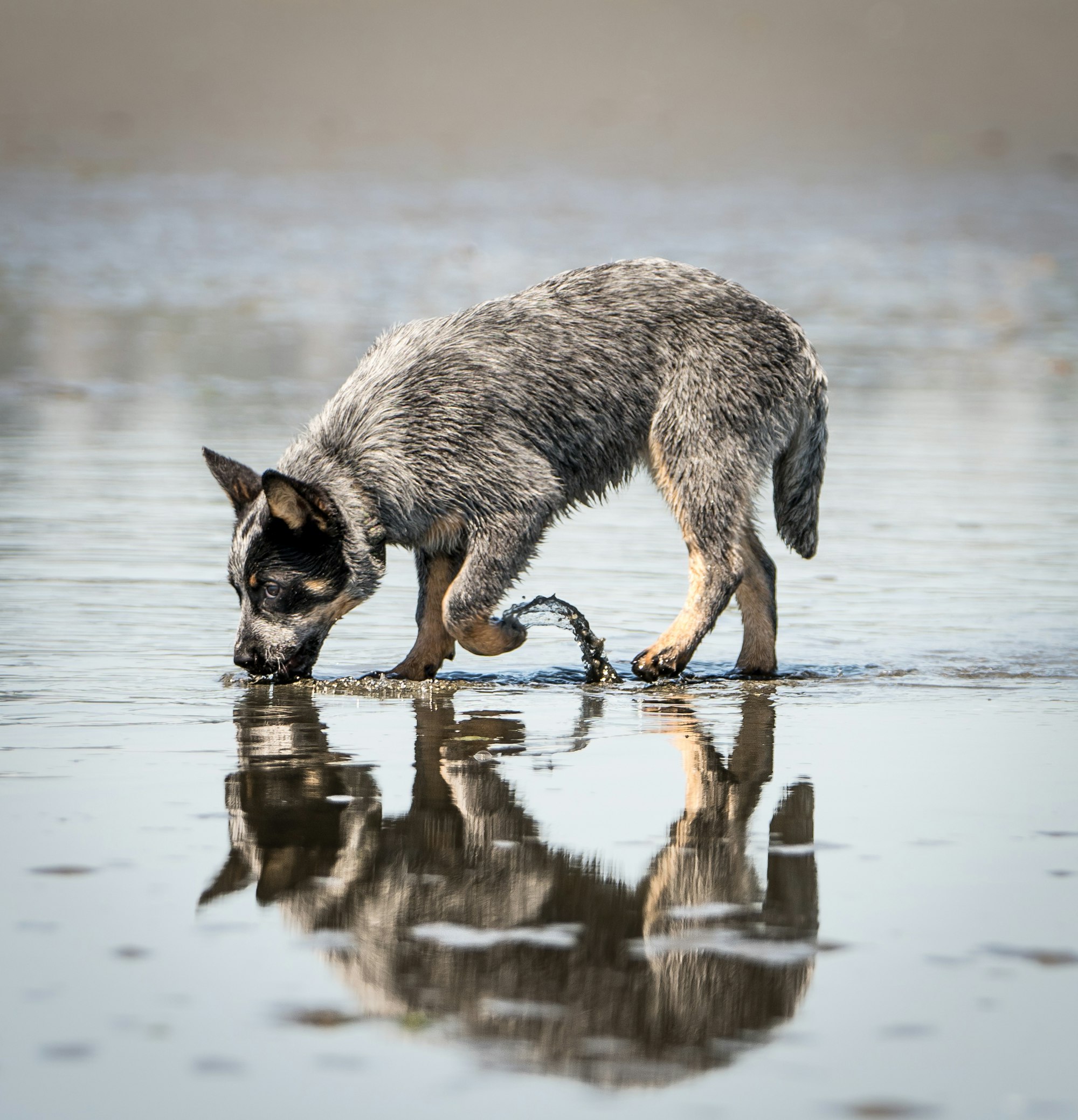
They Have a Parasite Load
Dogs get a number of parasites that can upset their stomachs. Puppies, especially, are prone to having parasites and must be put on dewormers. Dogs that have been living feral for a while, or those that are poorly bred and badly cared for may have them as well. Your veterinarian will identify the type of parasite and treat accordingly.
You might see the actual worms in the vomit or in the dog's stool. If you can take a sample in it makes the diagnosis quick.
There are some nasty protozoa like Giardia that live in streams and rivers, too. Sometimes called "beaver fever," humans and dogs can catch it by drinking from untreated water sources. It's a treatable condition, but has unpleasant symptoms, one of which could be vomiting. Tell your vet if you've taken your dog on a hike and suspect this is the problem. Prompt treatment will take care of the matter quickly, but it's not something that you can take care of without a prescription.
They Have Heat Exhaustion
Another possible explanation for your dog throwing up after drinking water is heat exhaustion. Dogs can become overheated rapidly, especially in hot weather or heatwave conditions. In an attempt to cool themselves down, they may consume excessive amounts of water, leading to subsequent vomiting.
It's crucial to closely monitor your dog during periods of high temperatures. If you notice signs of heat exhaustion, such as excessive panting, drooling, lethargy, or disorientation, immediate action is necessary. Move your dog to a shaded area, or preferably indoors under a fan or air conditioner, to provide relief from the heat. Offering small, frequent sips of cool water can help rehydrate them gradually.
However, it's important to note that if your dog's condition does not improve promptly or if they appear severely ill, it is vital to seek veterinary attention without delay. Heat exhaustion can escalate quickly and lead to life-threatening heatstroke. Certain breeds, especially short-nosed brachycephalic breeds like Bulldogs and Boston Terriers, are more susceptible to heat-related issues due to their anatomy. Nonetheless, any dog exhibiting heavy panting, distress, or signs of illness should be evaluated by a veterinary professional to ensure proper care and treatment.
Remember, prevention is key when it comes to heat-related illnesses. Take precautions to keep your dog cool, provide access to shade and fresh water, and avoid exposing them to excessive heat. By staying vigilant and seeking prompt veterinary care when necessary, you can help keep your furry companion safe and healthy during hot weather conditions.
They've Gotten Into Bad Water
One potential reason why your dog may throw up after drinking water is if they have come across and consumed bad water. While a little muddy puddle or stagnant water may not pose significant harm to your pet's overall health, it can be harsh on their tender tummy. Unlike wild animals that adapt to drinking from various sources, domesticated pets should not be exposed to unsafe water.
In such cases, it is advisable to allow your dog to naturally expel the contents from their system before offering fresh water. Allowing them to empty their stomachs can help alleviate any discomfort caused by ingesting contaminated water. Once they have finished vomiting, it's essential to reintroduce water gradually, starting with small amounts to prevent overwhelming their stomachs.
To prevent this situation from happening again, be mindful of your dog's environment during walks or outings. Avoid allowing them to drink from questionable water sources, such as puddles or standing water that may contain harmful bacteria or contaminants. Keeping a watchful eye and redirecting their attention away from unsafe water sources can help safeguard their well-being.
Remember, maintaining a healthy and clean water supply is crucial for your pet's hydration and overall health. Providing fresh and clean water from trusted sources, such as tap or filtered water, ensures they stay properly hydrated without compromising their digestive system. By taking preventive measures and offering safe water options, you can help your furry friend avoid the discomfort of ingesting bad water in the future.
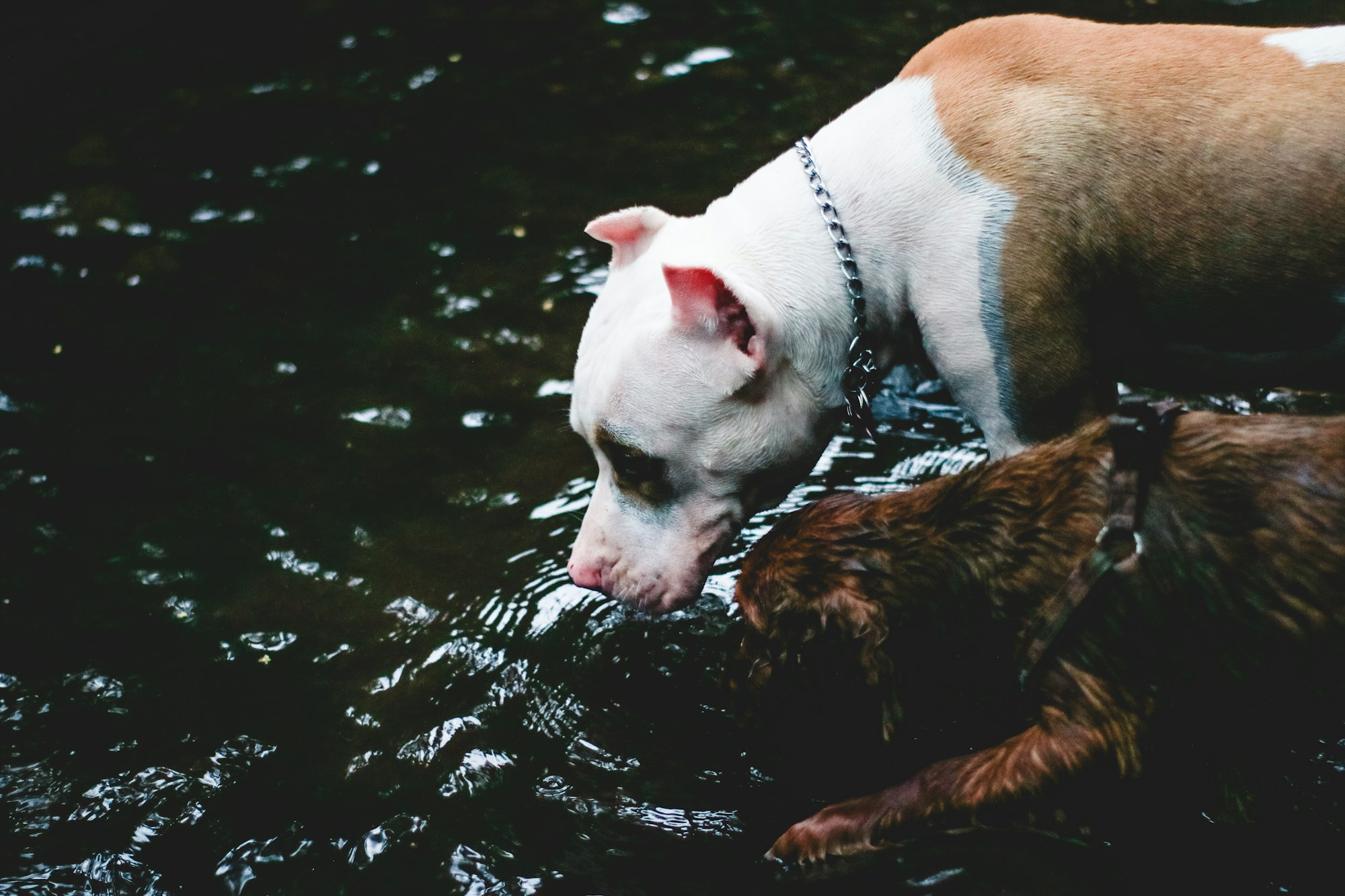
They've Gotten Into Chemicals in the Water - A Medical Emergency
One alarming reason why your dog may experience vomiting after drinking water is if they have ingested chemicals present in the water source. This situation calls for immediate attention, as it can pose a severe medical emergency. Certain cleaning chemicals, especially those found in bathroom and toilet bowl cleaners, can be toxic to pets if ingeste d. Similarly, substances like fertilizers, pesticides, and antifreeze can be extremely dangerous and potentially fatal.
If you suspect that your dog has consumed chemicals from the water source, it is crucial to act swiftly. First, contact your veterinarian immediately and inform them about the situation. Explain your concerns and mention the specific chemicals you suspect your dog may have come into contact with. Your vet will provide guidance and may instruct you to bring your dog directly to their office for an emergency evaluation.
It is essential for all pet owners to be prepared for emergencies by knowing how to contact a 24-hour emergency veterinary service. This ensures that you have access to professional assistance, even during hours when your regular veterinarian may not be available.
Remember, time is of the essence in cases involving potential chemical ingestion. Quick action can significantly increase the chances of a positive outcome for your beloved companion. By staying vigilant, maintaining a safe environment, and being prepared for emergencies, you can help safeguard your dog's well-being and provide them with the immediate care they need.
They Have Been Exposed to Blue-Green Algae
Another potential cause of vomiting after drinking water is exposure to blue-green algae, especially during the summertime. Bodies of standing water, such as ponds or lakes, can become stagnant and develop blooms of blue-green algae, also known as cyanobacteria. Unfortunately, this situation calls for immediate attention as it can pose a serious emergency for your dog's health.
To prevent exposure to blue-green algae, it is crucial to avoid letting your dog swim in or drink from stagnant water sources. However, accidents can happen, and if you suspect your dog has been exposed to blue-green algae, it is vital to seek veterinary care promptly. There are no home treatments for this condition, and professional intervention is necessary.
When contacting your veterinarian, explain the situation and provide details about your dog's exposure to blue-green algae. They will guide you on the next steps, which may involve bringing your dog in for immediate evaluation and treatment. Time is critical in these cases, as blue-green algae can release toxins that are harmful or even deadly to dogs.
Prevention is the best approach to keep your dog safe from blue-green algae. Stay vigilant when near bodies of water, especially during warm weather, and avoid letting your dog access areas where blue-green algae blooms are visible. By taking proactive measures and seeking veterinary care without delay, you can help ensure the well-being of your furry companion and protect them from the dangers associated with blue-green algae exposure.
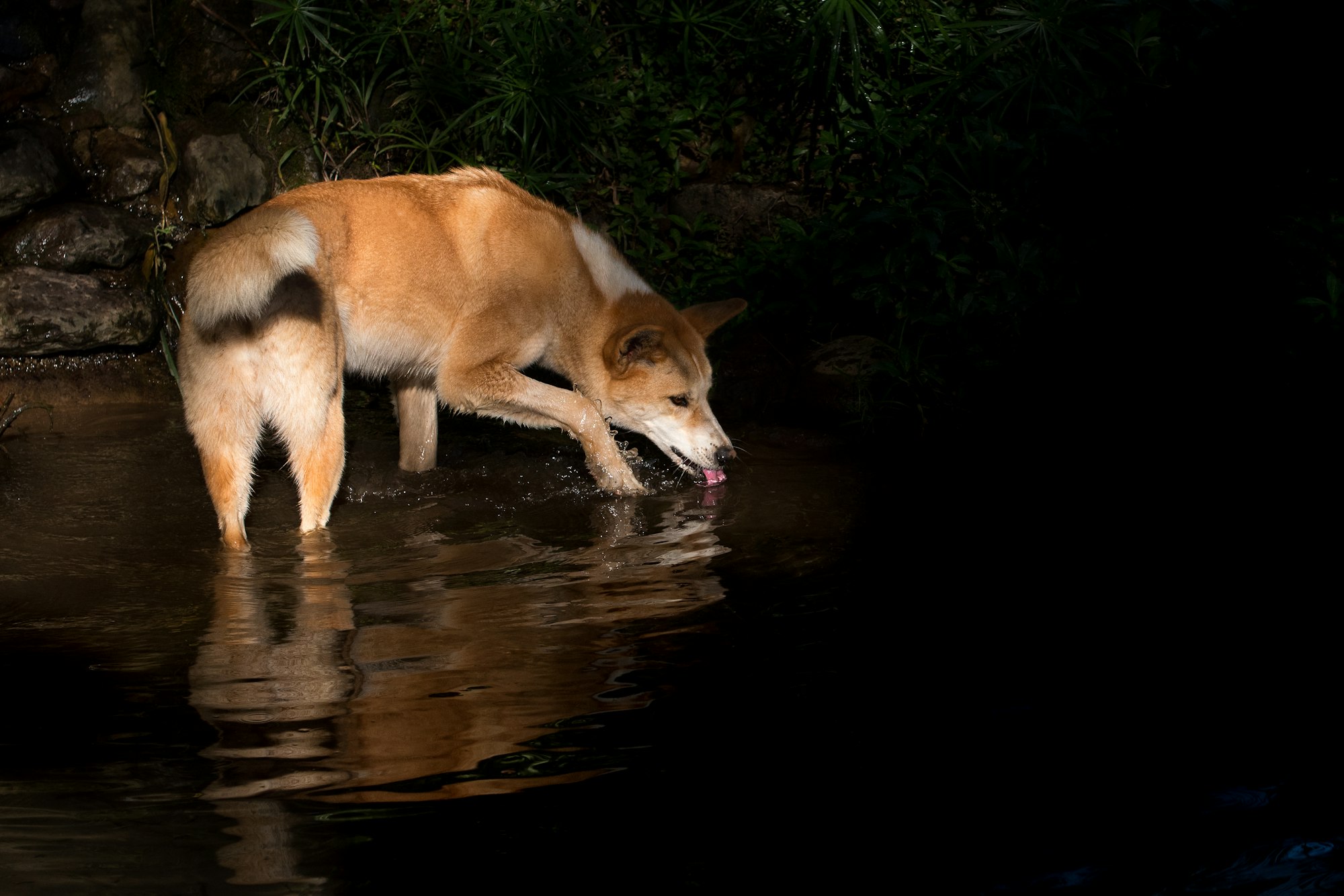
They May Have a Twisted Stomach
Certain dog breeds are susceptible to a dangerous condition known as stomach torsion or twisted stomach, medically referred to as gastric dilatation-volvulus (GDV). This issue is especially common in large dogs with deep chests, such as Great Danes and Boxers. In fact, according to various studies, nearly 42% of Great Danes may suffer from GDV during their lifetime, making it a significant concern for these breeds. In this condition, the dog's stomach rotates upon itself, restricting blood flow and hindering digestion. Without immediate veterinary intervention, this condition can be fatal, with the mortality rate being around 10% to 33%, even with treatment .
Symptoms include vomiting, refusal or inability to eat, and escalating pain. If left untreated, the condition can cause the gut tissue to die, leading to a traumatic death for the dog. Immediate surgical intervention is necessary to save the dog's life.
To prevent future occurrences, veterinarians may opt to surgically anchor the stomach in place, although this method is not foolproof. As a pet owner, you'll also need to follow specific feeding guidelines. Monitoring for signs like excessive drooling from the dog's jowls can provide early warning indicators, allowing for timely medical intervention.
They May Have a Genetic Condition
In rare and unfortunate instances, a dog may be born with a condition known as megaesophagus. This condition is characterized by the pup's inability to properly swallow food or water. It is a distressing and challenging condition that requires immediate attention and care. Megaesophagus is more commonly observed in certain breeds such as Pugs, Great Danes, and some hunting breeds.
Megaesophagus occurs when the esophagus, the muscular tube that transports food from the mouth to the stomach, fails to function properly. This can result in difficulties in moving food and water down into the stomach, leading to regurgitation and vomiting shortly after ingestion.
Unfortunately, the outlook for dogs with megaesophagus is not favorable, and managing the condition can be quite challenging. Affected dogs often require special feeding techniques, such as feeding them in an upright position or using specially designed feeding device called a bailey chair to help facilitate the passage of food into the stomach.
Furthermore, it is crucial to note that megaesophagus can have a genetic component. Therefore, responsible breeding practices are essential to avoid passing on this condition to future generations. Affected bloodlines should not be bred to prevent the perpetuation of this genetic disorder.
If you suspect that your dog may have megaesophagus, it is crucial to consult with a veterinarian experienced in managing this condition. They can provide a proper diagnosis, offer guidance on appropriate management strategies, and help ensure your dog's well-being.
While megaesophagus presents significant challenges, with appropriate care and support, affected dogs can still lead fulfilling lives. Megaesophagus is a condition where the esophagus loses its ability to contract, leading to difficulty swallowing. It can be congenital or acquired, and certain breeds are more predisposed. Research shows that between 25-30% of dogs with congenital megaesophagus also have additional conditions like persistent right aortic arch, a vascular ring anomaly that constricts the esophagus.
Additionally, raising awareness and informed breeding decisions can minimize the occurrence of such conditions. Certain breeds, including German Shepherds, are at a higher risk, with one study suggesting a significant genetic predisposition to this condition, especially in purebreds.

The Good News About Dogs That Vomit Water
Some of those last conditions and unusual occurrences are grim. But they are rare, and most are treatable. The important thing to watch out for is whether or not your dog seems sick after it vomits water.
It's certainly a good idea to call your vet if you have any concerns at all, but most often, it's something that you can monitor at home for a while. If the dog goes back to its normal activity, is eating, and is able to drink once the vomiting stops, then it's probably OK to mention it at your next appointment.
When vomiting frequently recurs, your vet might test for underlying health conditions and mechanical issues. Tests can reveal treatable illnesses which might need lifelong follow-up for your pup. If it turns out that your dog just has a weak tummy, you may come home with a prescription for an antacid.
But it's often the case that your dog just needs to slow down and drink more carefully when it gets excited. It can be a pain to clean up water from the floor, but dog owners know that it's just part of the bargain when your best friend has a drinking problem.
Conclusion:
In conclusion, if your dog is vomiting after drinking water, it's essential to consider various factors. Overdrinking, drinking too quickly, or an underlying medical condition could all be contributing to this issue. While occasional vomiting may not be a significant cause for concern, persistent or severe symptoms should prompt an immediate visit to the veterinarian.
Testing and diagnosis can help rule out serious conditions like kidney issues, infections, or even poisoning. A tailored treatment plan can then be implemented based on your dog's specific needs. Observing your dog's drinking habits and keeping track of any accompanying symptoms can provide valuable insights and aid in faster diagnosis and treatment. Remember, always consult your veterinarian for an accurate diagnosis and appropriate treatment plan.
FAQs
Why is my dog vomiting immediately after drinking water?
There are various reasons why your dog might vomit after drinking water. It could be due to drinking too quickly, overhydration, or even an underlying medical issue. If the issue persists, consult a veterinarian for a proper diagnosis.
Is it normal for a dog to throw up water occasionally?
Occasional vomiting may not be a significant concern and can be related to minor digestive disturbances or overexcitement. However, if vomiting persists or worsens, consult a veterinarian for proper evaluation and treatment.
What should I do if my dog throws up water?
Observe your dog closely for any other symptoms like lethargy, diarrhea, or additional vomiting episodes. Make sure fresh water is available but encourage your dog to drink slowly. If the symptoms persist, consult a veterinarian as soon as possible.
Could throwing up water be a sign of poisoning or a severe medical issue?
While rare, vomiting water can be a symptom of poisoning or serious medical conditions like kidney failure or infections. If your dog shows other symptoms, appears distressed, or has a history of ingesting toxic substances, seek immediate veterinary care.
How can I prevent my dog from vomiting after drinking water?
You can try limiting the amount of water your dog drinks in one go, or offering smaller amounts more frequently. Using special dog bowls designed to slow down drinking can also help. However, if the issue persists, consult your veterinarian for advice tailored to your dog's specific condition.
For more helpful articles about pet-parenting tips, check out the Off Leash blog at TryFi.com.
Want to know more about TryFi.com? The Fi Dog Collar is a GPS tracking collar that not only keeps track of your dog’s location, activity levels, and sleep patterns, but it also alerts you if your dog escapes your backyard. This is the fastest way to find your dog after an escape. Try the Fi Dog Collar today!

